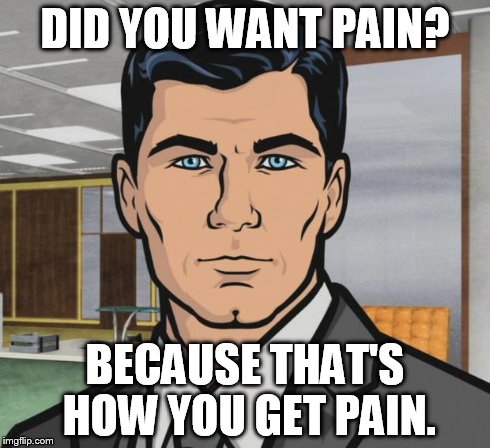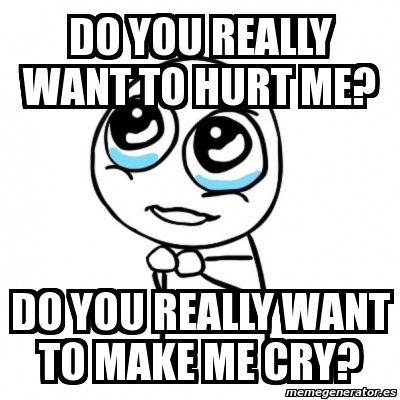Do You Want Pain? Unpacking A Viral Meme And Life's Profound Question
The "Do You Want Pain?" Meme Phenomenon
The journey of "Do you want pain?" from an obscure soundbite to a recognizable internet trend is a fascinating case study in digital virality. It's a phrase that, once heard, is hard to forget, often delivered with a menacing or robotic inflection that adds to its comedic and impactful nature.From Green Screens to TikTok Trends: The Meme's Journey
The phrase "Do you want pain?" gained significant traction as a popular sound effect used in various internet videos. Its origins can be traced back to specific green screen meme videos, often associated with games like "Pillar Chase," "Pillar Chase 2," and other Roblox or One-Punch Man-inspired content. These videos frequently feature characters or scenarios where the question is posed, usually before some intense action or an unexpected comedic turn. Platforms like TikTok, YouTube Shorts, and Myinstants (a popular soundboard library) became fertile ground for its spread. Users could easily download the non-copyright, royalty-free sound effect and integrate it into their own creations. Whether it was a dramatic reveal, a funny reaction to a challenging situation, or simply a bizarre non-sequitur, the "Do you want pain?" sound button became a versatile tool for content creators. Its abruptness and unique delivery made it perfect for short, punchy videos designed for maximum engagement.Why It Resonated: Cultural Significance and Versatility
The widespread adoption of "Do you want pain?" as a meme speaks to its inherent appeal. Its cultural significance lies in its ability to be both humorous and strangely relatable. In many contexts, it's used ironically, challenging viewers with a dramatic question before revealing something mundane or silly. For instance, a TikTok video might show someone facing a minor inconvenience, followed by the "Do you want pain?" sound, turning a small struggle into a mock epic battle. Its versatility is key. From gaming communities using it to taunt opponents ("Do you want pain?!. 🗣️🥵🔥‼️#roblox #strongestbattlegrounds #onepunchman") to general funny reels and jokes ("Do you? 😩#fyp #funny #reels #jokes #memes #marvelrivals"), the meme has found its way into countless scenarios. The simple act of listening and sharing the "do you want pain" sound effect became a communal experience, uniting internet users through shared humor and recognition.Pain: An Unavoidable Force for Growth and Understanding
Beyond the internet's playful facade, the question "Do you want pain?" resonates on a much deeper, more existential level. It forces us to confront our relationship with suffering, discomfort, and the challenges that life inevitably throws our way.The Human Instinct to Avoid Pain (And Why We Can't Always)
From the moment we are born, our bodies and minds are wired to avoid pain. A child recoils from a hot stove; an adult seeks comfort when feeling nauseous or experiencing the stinging sensation of a cut. This basic instinct is crucial for survival, protecting us from harm. We naturally want to live our lives free from suffering, to be more than just "a sufferer enduring pain." Of course not, you may be thinking. However, the reality of life is that pain, in its myriad forms – physical, emotional, psychological – is an unavoidable companion. It's a fundamental part of the human experience. The question then shifts from "Do you want pain?" to "How do you respond to the pain you inevitably encounter?"The Paradox of Pain: How Discomfort Fuels Pleasure and Achievement
Here lies one of life's profound paradoxes: "Without pain, there would be no pleasure." This isn't to say we should actively seek out suffering, but rather to acknowledge that contrast is essential for appreciation. Without knowing what pain feels like, how could we truly understand and cherish moments of joy, comfort, and relief? Pain provides the necessary backdrop against which pleasure can truly shine. Furthermore, "almost nothing worthwhile in life comes without it." Consider any significant achievement: mastering a skill, building a successful career, nurturing a deep relationship, or overcoming a personal challenge. Each of these endeavors requires effort, sacrifice, perseverance, and often, discomfort. The "pain" of discipline, hard work, setbacks, and vulnerability is often the very fuel that inspires us "to heights you otherwise would not climb." It's the discomfort of the journey that makes the destination so rewarding. Often, "the way to avoid one pain is to go through another" – choosing the pain of effort today to avoid the pain of regret tomorrow.Pain as a Compass: Guiding Us Towards What Matters
Pain, whether a dull cramp or a sharp sting, serves as a vital signal. Physical pain alerts us to potential harm, prompting us to heal or seek help. Emotional pain, such as heartbreak, grief, or frustration, can signal areas in our lives that need attention, change, or growth. It can be a powerful compass, guiding us towards what truly matters, highlighting our vulnerabilities, and revealing our strengths.Beyond the Meme: Actively Engaging with Life's Inevitable Discomfort
So, when the universe, or perhaps a meme, asks, "Do you want pain?", how do we respond? It's not about passively accepting suffering, but about actively engaging with the discomfort that leads to growth.Understanding Different Shades of Pain: From a Cut to a Cramp
We experience pain in countless ways. "Whenever I’m in pain, like I accidentally cut myself and it’s stinging or I feel a little nauseous, usually when it’s dull pain like cramps," these everyday physical discomforts remind us of our physical limitations and the need for care. Emotional pain, though invisible, can be just as debilitating, arising from loss, failure, or existential questions about what we want out of life. Recognizing the different "shades" of pain helps us approach them with appropriate strategies.The Choice Within the Challenge: What Do YOU Want?
The philosophical "Do you want pain?" isn't a literal invitation to suffer, but a challenge to choose your discomfort. Do you want the pain of stagnation, regret, and unfulfilled potential, or the pain of discipline, hard work, and growth? "Does this mean everything you want requires pain and suffering? Yes and no." It means everything *worth having* often requires pushing past comfort zones. It means choosing the path that, while perhaps more difficult in the short term, leads to a richer, more meaningful life.Finding Your "Something for the Pain": Coping, Creating, and Conquering
When faced with pain, we instinctively look for "something for the pain." This could be physical relief, emotional support, or even creative expression. The data mentions, "So do you know what you want to paint? Do you want something for the pain?" This can be interpreted as seeking ways to cope, to express, or to transform pain. Sharing incredible ideas, connecting with loved ones, or engaging in creative pursuits can be powerful ways to navigate discomfort and even turn it into something beautiful. It's about finding healthy mechanisms to process and overcome, rather than simply enduring. Ultimately, the viral meme "Do you want pain?" serves as a fascinating cultural artifact and a surprising catalyst for introspection. It reminds us that while we may never actively "want" pain, it is an undeniable part of the human journey. Embracing this truth allows us to transform discomfort from an obstacle into a powerful tool for growth, resilience, and the ultimate appreciation of pleasure. The question isn't whether pain will come, but how we choose to respond when it does. --- **Summary:** The phrase "Do you want pain?" has become a popular internet meme and sound effect, widely used in green screen videos, gaming content, and TikTok for its abrupt and humorous delivery. Beyond its viral appeal, the question prompts a deeper philosophical reflection on the role of pain in life. While humans naturally avoid pain, it is an unavoidable and essential component of growth, enabling us to appreciate pleasure and achieve worthwhile goals. By understanding different types of pain and choosing to engage with discomfort proactively, we can transform challenges into opportunities for personal development and find healthy ways to cope and thrive.
Do you want pain? Meme Sound Effect - Voicy

Archer Meme - Imgflip

Meme Por favor - Do you really want to hurt me? Do you really want to